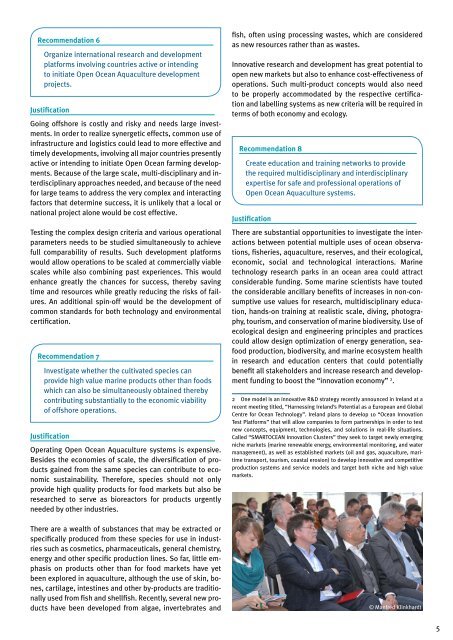Bremerhaven Declaration Part II - Aquaculture Forum Bremerhaven
Bremerhaven Declaration Part II - Aquaculture Forum Bremerhaven
Bremerhaven Declaration Part II - Aquaculture Forum Bremerhaven
Create successful ePaper yourself
Turn your PDF publications into a flip-book with our unique Google optimized e-Paper software.
Recommendation 6<br />
Organize international research and development<br />
platforms involving countries active or intending<br />
to initiate Open Ocean <strong>Aquaculture</strong> development<br />
projects.<br />
Justification<br />
Going offshore is costly and risky and needs large investments.<br />
In order to realize synergetic effects, common use of<br />
infrastructure and logistics could lead to more effective and<br />
timely developments, involving all major countries presently<br />
active or intending to initiate Open Ocean farming developments.<br />
Because of the large scale, multi-disciplinary and interdisciplinary<br />
approaches needed, and because of the need<br />
for large teams to address the very complex and interacting<br />
factors that determine success, it is unlikely that a local or<br />
national project alone would be cost effective.<br />
Testing the complex design criteria and various operational<br />
parameters needs to be studied simultaneously to achieve<br />
full comparability of results. Such development platforms<br />
would allow operations to be scaled at commercially viable<br />
scales while also combining past experiences. This would<br />
enhance greatly the chances for success, thereby saving<br />
time and resources while greatly reducing the risks of failures.<br />
An additional spin-off would be the development of<br />
common standards for both technology and environmental<br />
certification.<br />
Recommendation 7<br />
Investigate whether the cultivated species can<br />
provide high value marine products other than foods<br />
which can also be simultaneously obtained thereby<br />
contributing substantially to the economic viability<br />
of offshore operations.<br />
Justification<br />
Operating Open Ocean <strong>Aquaculture</strong> systems is expensive.<br />
Besides the economies of scale, the diversification of products<br />
gained from the same species can contribute to economic<br />
sustainability. Therefore, species should not only<br />
provide high quality products for food markets but also be<br />
researched to serve as bioreactors for products urgently<br />
needed by other industries.<br />
There are a wealth of substances that may be extracted or<br />
specifically produced from these species for use in industries<br />
such as cosmetics, pharmaceuticals, general chemistry,<br />
energy and other specific production lines. So far, little emphasis<br />
on products other than for food markets have yet<br />
been explored in aquaculture, although the use of skin, bones,<br />
cartilage, intestines and other by-products are traditionally<br />
used from fish and shellfish. Recently, several new products<br />
have been developed from algae, invertebrates and<br />
fish, often using processing wastes, which are considered<br />
as new resources rather than as wastes.<br />
Innovative research and development has great potential to<br />
open new markets but also to enhance cost-effectiveness of<br />
operations. Such multi-product concepts would also need<br />
to be properly accommodated by the respective certification<br />
and labelling systems as new criteria will be required in<br />
terms of both economy and ecology.<br />
Recommendation 8<br />
Create education and training networks to provide<br />
the required multidisciplinary and interdisciplinary<br />
expertise for safe and professional operations of<br />
Open Ocean <strong>Aquaculture</strong> systems.<br />
Justification<br />
There are substantial opportunities to investigate the interactions<br />
between potential multiple uses of ocean observations,<br />
fisheries, aquaculture, reserves, and their ecological,<br />
economic, social and technological interactions. Marine<br />
technology research parks in an ocean area could attract<br />
considerable funding. Some marine scientists have touted<br />
the considerable ancillary benefits of increases in non-consumptive<br />
use values for research, multidisciplinary education,<br />
hands-on training at realistic scale, diving, photography,<br />
tourism, and conservation of marine biodiversity. Use of<br />
ecological design and engineering principles and practices<br />
could allow design optimization of energy generation, seafood<br />
production, biodiversity, and marine ecosystem health<br />
in research and education centers that could potentially<br />
benefit all stakeholders and increase research and development<br />
funding to boost the “innovation economy” 2 .<br />
2 One model is an innovative R&D strategy recently announced in Ireland at a<br />
recent meeting titled, “Harnessing Ireland’s Potential as a European and Global<br />
Centre for Ocean Technology”. Ireland plans to develop 10 “Ocean Innovation<br />
Test Platforms” that will allow companies to form partnerships in order to test<br />
new concepts, equipment, technologies, and solutions in real-life situations.<br />
Called “SMARTOCEAN Innovation Clusters” they seek to target newly emerging<br />
niche markets (marine renewable energy, environmental monitoring, and water<br />
management), as well as established markets (oil and gas, aquaculture, maritime<br />
transport, tourism, coastal erosion) to develop innovative and competitive<br />
production systems and service models and target both niche and high value<br />
markets.<br />
© Manfred Klinkhardt<br />
5


